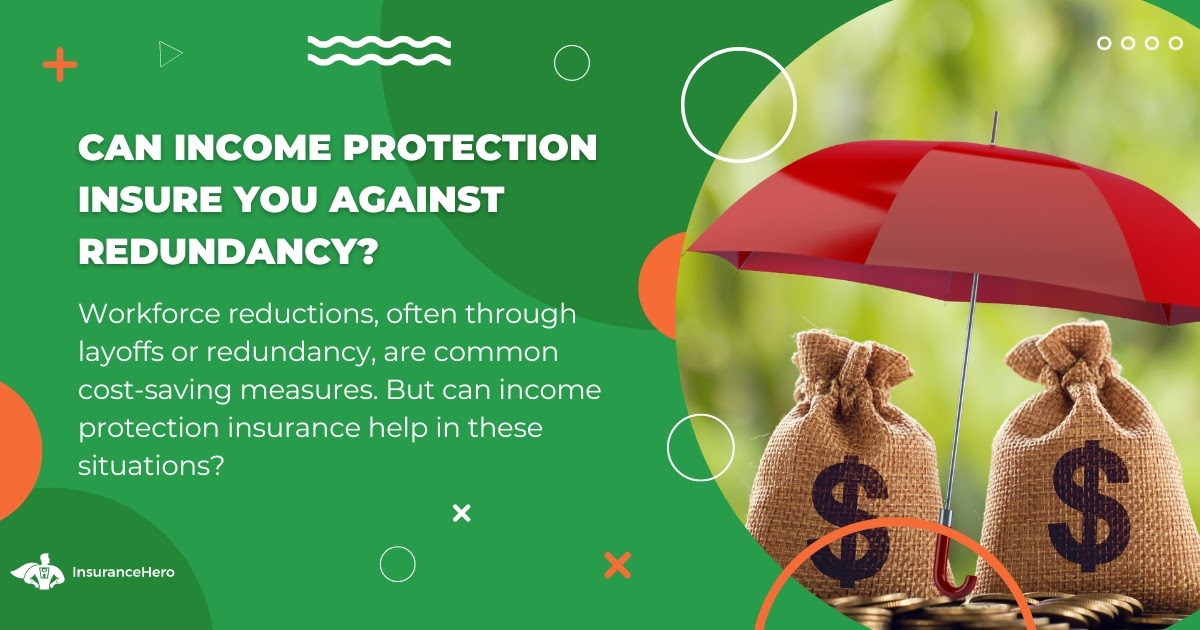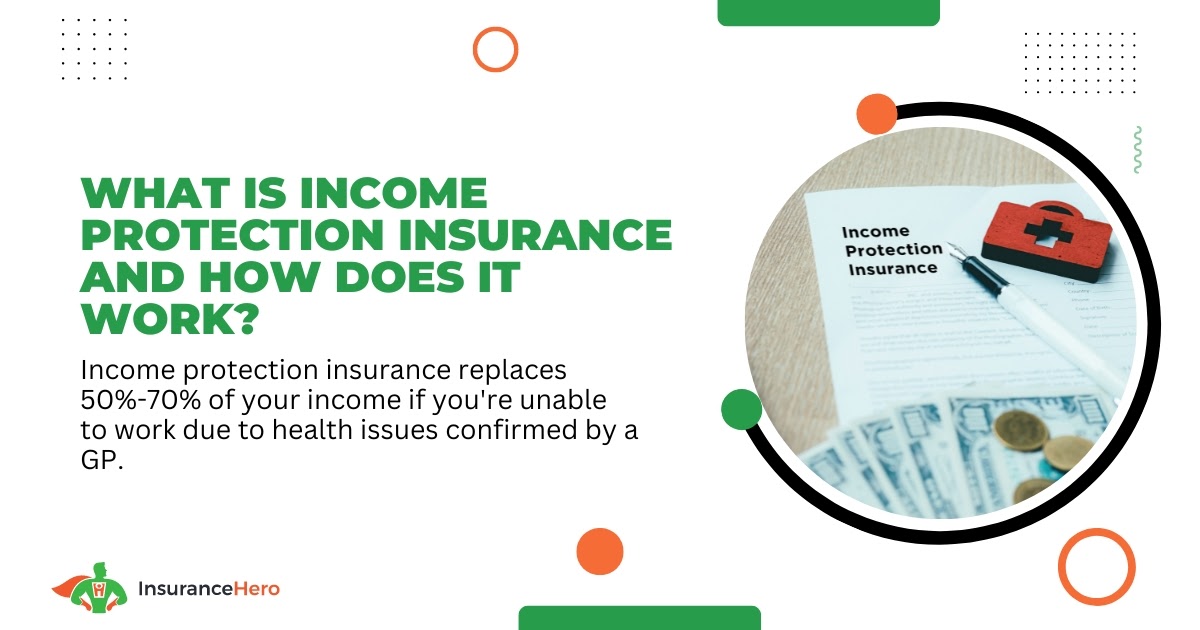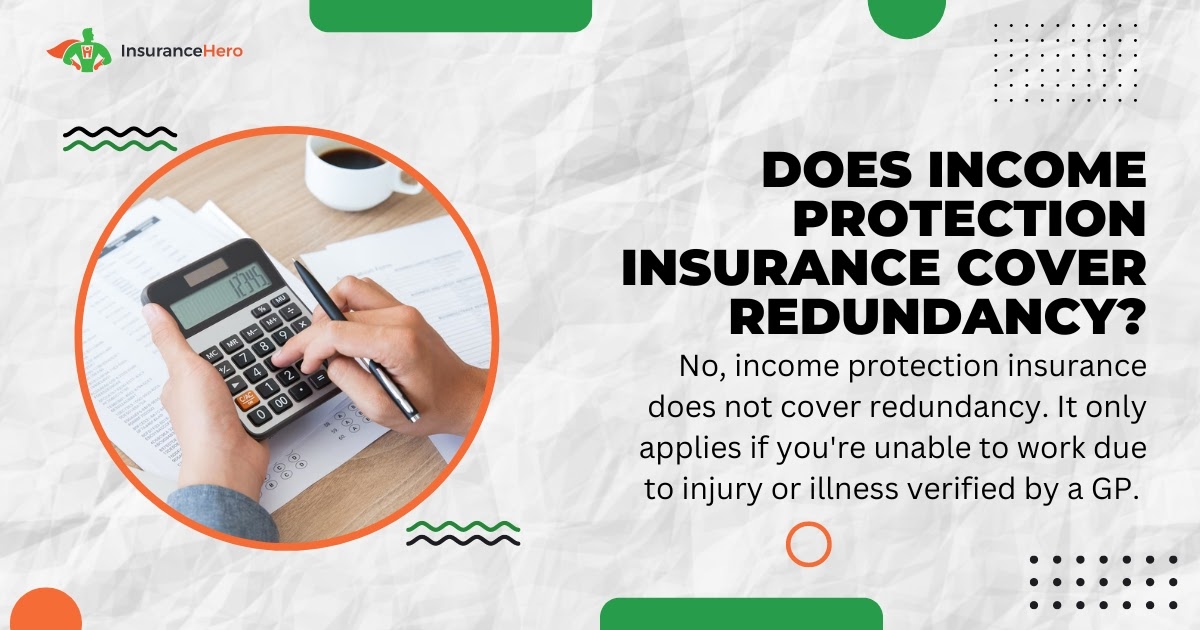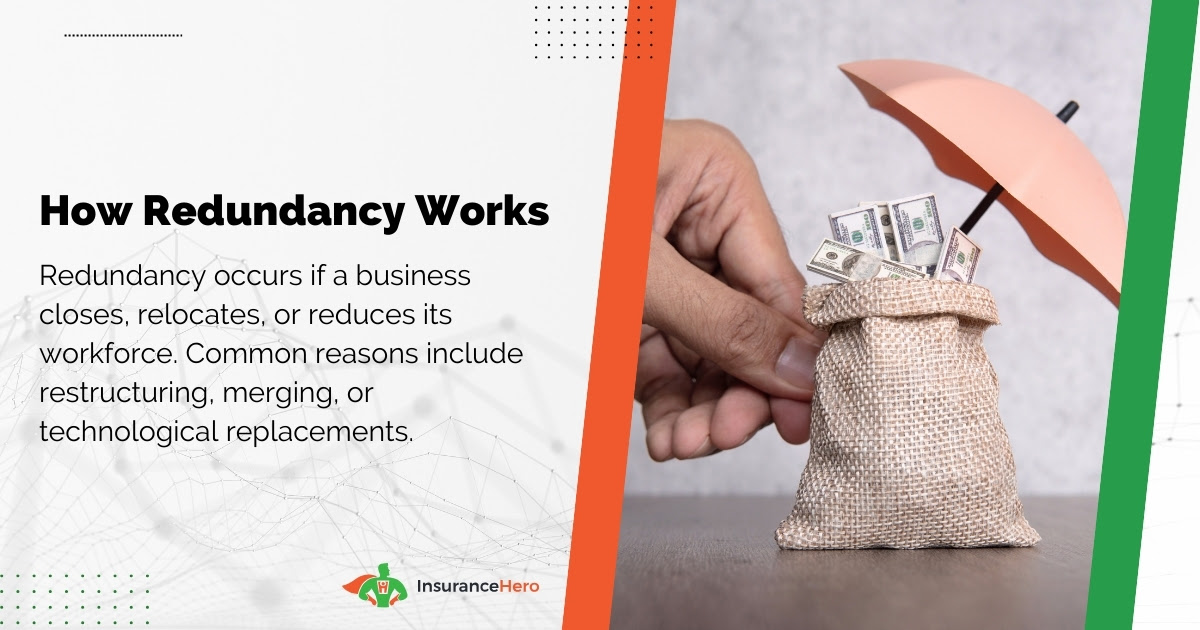Does Income Protection Cover Redundancy?

When times are tough, when the economy turns downward, or when corporate profits demand a reduction in expenses, employees often suffer.
One of the most common ways to cut costs is to reduce the workforce; after all, salaries are expensive, benefits add up, and gig workers or overseas outsourcing are much lower on the balance sheet.
There are several different ways an employee can be released from employment. Termination, layoffs, and redundancy can all happen and have slightly different legal repercussions.
A commonly asked question is does income protection cover redundancy?
Income Protection and Redundancy In Summary:
When times are tough, employees can face redundancy due to economic downturns or corporate cost-cutting measures.
At Insurance Hero, we’ll explain what income protection insurance covers.
Here’s why it’s worth considering:
- No Redundancy Coverage: Income protection insurance does not cover redundancy, lay-offs, or terminations. It is focused only on health-related work absences.
- Redundancy Cover Insurance: Specifically designed to cover redundancy, it gives you short-term income replacement, usually lasting up to 12 months and up to 70% of your income.
- Determine What You Need: Look at your financial situation, any existing coverage, and your risk tolerance to decide if redundancy insurance is right for you.

What is Income Protection Insurance, and How Does it Work?
Income protection insurance is a similar product to life insurance, which is why we’re covering it here on Insurance Hero. It aims to replace between 50% and 70% of your income if you’re forced out of work.
It’s important to note, however, that the reason you are forced out of work has to be because of health issues spurred on by a GP.
In other words, if you are rendered unable to work due to injury or illness and a GP can verify that fact, income protection insurance can be claimed.
One significant difference between income protection insurance and more traditional forms of life insurance is that your payments will come in monthly rather than as one lump sum or as an annuity.
This means you aren’t suddenly faced with the need to manage a large amount of money and ration it until it runs out. Instead, it simply replaces some portion of your income.
You can maintain a standard of living, though you will often have to tighten your belt to make ends meet until you can replace your income with another job.
Another significant difference between income protection insurance and other forms of life insurance is that it’s not a one-time deal.
You can maintain your policy and ongoing cover when you make a claim. When you return to work – if you return to work – and if you are then rendered unable to work again, you can make another claim.
There may be details of your policy that put limits on how many times you can make claims in a given period, but that’s on a per-policy basis and varies based on your cover.

Does Income Protection Insurance Cover Redundancy?
Bringing things back around, we ask the same question: does income protection insurance cover you if you’re made redundant? Unfortunately, the answer is no.
Income protection insurance covers you if you cannot work due to injury or illness. On the other hand, it does not cover you in the event of your death (that’s regular life insurance), if you retire, if you’re laid off, if you’re terminated, or if you’re made redundant.
In short, it generally has to be health-related reasons why you’re no longer able to work.
Income protection insurance may also be more or less restrictive depending on the definition of incapacity that your insurance provider uses. There are generally two primary options you’ll see:
- Own Occupation: This is if you’re rendered unable to do your job but could potentially do another job. For example, a construction worker could be injured and rendered incapable of performing construction tasks but could remain employed in a desk job until they recover; they could still claim income protection insurance, though the payout will generally be lower, commensurate with the amount of salary they still draw.
- Any Occupation: This is if you’re unable to do any job. This is much stricter and requires you to be entirely unable to work. Moreover, some insurance providers maintain lists of low-activity jobs to use as a benchmark and may disqualify you because you can technically perform those jobs (even if those jobs aren’t available anywhere near you.)
So, if there’s no way for income protection insurance to cover you if you’ve been made redundant, are there any insurance products that will? Fortunately, the answer is yes.

What is Redundancy Cover Insurance, and How Does it Work?
Instead of income protection insurance, you’re generally looking for a different kind of insurance called redundancy cover. This insurance can also be found under other names, notably unemployment insurance.
- Redundancy insurance is a form of insurance designed to provide short-term income protection specifically for redundancy, rather than for health-related issues.
- With this kind of cover, a similar set of circumstances applies; you can apply for cover if you’re made redundant, but not if you’re terminated or have health problems that render you unable to work.
- Usually, redundancy insurance lasts up to 12 months. It will help replace your income during that time while you seek other work.
However, there are a few significant limitations to redundancy insurance:
First and foremost, the amount they will cover isn’t your full salary. You can generally insure up to about 70% of your income, though some policies will offer a lower amount for a correspondingly lower premium.
You must evaluate how much you’re willing to pay to insure your income against redundancy.
A second restriction is that redundancy insurance cover is often only available to people employed full-time with a firm in the UK.

If you’re employed part-time, a gig worker, work remotely, or freelance, or are self-employed or run your own small business, redundancy insurance won’t be available to you.
Depending on the policy, you may also lose cover if you’re dropped from full-time to part-time.
One of the most significant restrictions that catches many people off guard when shopping for redundancy insurance is that there’s usually a probation period before you can make a claim on your policy.
This is meant to prevent people from only signing up for cover when they know they’re about to be made redundant, making a claim immediately, and cancelling as soon as they no longer need it.
Being exploited like that would leave the insurance providers insolvent, so they often require some period, such as six months or one year, before a policy can be claimed.
The final restriction is that redundancy insurance isn’t commonly a stand-alone insurance product.
Why are we mentioning it, then? Well, it’s a product that can often be bundled with various other insurance types.
For example, if you buy income protection insurance, you might be able to bundle it with redundancy insurance.
You may also be able to get redundancy insurance as part of a life insurance policy or as part of combined accident, sickness, and unemployment coverage.
This means that if you want income protection from both health issues and redundancy, you will want to proactively seek out insurance cover as soon as possible and maintain it to ensure that it’s there when you need to claim it.
If you’re thinking, “What if I never need to claim it? Then I’m paying for insurance cover that I never use, and that’s just an additional expense,” you’re not wrong.
Then again, that’s how most forms of insurance work. You’re not buying the results; you’re buying peace of mind while you go about your business and a fallback if the worst happens along the way.
Do You Need Redundancy Insurance Cover?
Whether you need redundancy insurance depends on your overall financial situation, your employment status, and your risk tolerance.
To determine whether redundancy insurance is worthwhile, consider two primary factors:
First, what are your expenses and obligations? You have bills, a mortgage or rent, other debts, and ongoing costs like food and petrol.
You may also have expenses related to medical care, childcare, raising a family, and more.
How do those expenses look in comparison to your income and to your savings?
Can you dial back on them – cut out summer camp and music lessons, take public transportation or use a bike instead of a car, buy cheaper food products – or are you already living lean?
Second, look at your existing finances. Ignore income for the moment and consider whether you have an emergency fund. Do you have savings and investments?
How long can you maintain your standard of living if your income drops to zero? The greater your buffer, the less you need income replacement from an insurance product.
On the other hand, the closer you are to nothing, living cheque to cheque, the more likely you are to need an income replacement product.

Finally, other sources of income replacement should be considered. For example, the government provides some level of redundancy pay called statutory redundancy pay, which is based on your employment history.
It’s not a lot of cover – you can read the details here – but it’s an additional layer of buffer to help keep you going while you seek new work.
Another thing to consider is that you may already have additional support from an existing insurance product.
Many people have life insurance that offers some form of income protection and redundancy cover as additional riders. Others have catastrophic cover that will cover some amount of redundancy or health issues, though it may not be much.
You may also have mortgage payment protection insurance, or MPPI, which can serve a similar purpose.
Instead of covering some particular amount of your salary, they cover your mortgage payments, so if you lose your job for any reason and can no longer pay your mortgage, the insurance can step in and keep up payments for a time.
If, once you’ve evaluated all of these factors, you find that you’re still in a precarious position, it’s probably a good idea to shop around for redundancy and related insurance products.
Our team are standing by to talk to you, or you can fill out a simple form to compare insurance quotes directly.
Other guides related to this topic:
Income Protection Insurance For Dentists
Are you a self-employed or an NHS dentist? Do you worry about what would happen financially to you and your loved ones s…
Income Protection Insurance For Doctors 2025
Income protection insurance for doctors plans work by providing a replacement salary if you cannot do your work due to a…
Joint Income Protection Insurance For Dual Income Couples
If you’re in a similar situation to 25% of couples with a dual income, you’ll never have even contemplated Income Pr…
Can You Get Group Income Protection Insurance?
Are you worried about how you’ll cope financially if illness or injury stops you working? In 2024 alone, insurer…
Self-Employed Income Protection Insurance
Working as self-employed can be immensely rewarding if a business becomes successful and, with no employer or boss to re…
Income Protection Insurance For Vets 2025
Being a vet can be a challenging yet immensely satisfying profession. Accidents and injuries can occur in the workpl…
Income Protection Insurance For Contractors
Do you worry about how you will pay the bills if you cannot work? Do you have loved ones who would suffer from financial…
How Much Does Income Protection Insurance Cost?
While most people aim for the maximum amount of cover for the minimum cost, the actual cost of income protection insuran…
Income Protection Insurance For Teachers 2025 Guide
Receive a monthly income for as long as you need if you are off work sick or physically injured – it is that simple. …
Does UK Income Protection Insurance Cover Maternity Costs?
If you’ve just learned that your family is about to grow, there’s a good chance you’re filled with both tremendous…
Steve Case is a seasoned professional in the UK financial services and insurance industry, with over twenty years of experience. At Insurance Hero, Steve is known for his ability to simplify complex insurance topics, making them accessible to a broad audience. His focus on clear, practical advice and customer service excellence has established him as a respected leader in the field.


